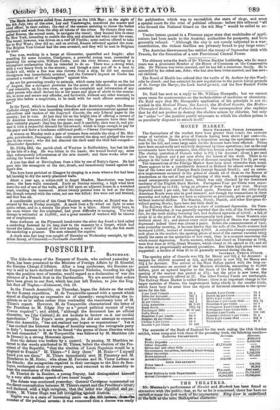POSTSCRIPT.
SAT URD AY.
The Aide-de-camp of the Emperor of Russia, who arrived yesterday in Paris, has been presented to the Minister of Foreign Affairs by M. Kisselef, the Russian Chargd,d'Affaires. After a long conference, the Russian en- voy is said to have declared that the Emperor Nicholas founding h right alani the positive text of treaties, would regard as a declaration his of war the entrance of a French fleet in the Dardanelles. We are assured that orders have been given to our fleet, which has just left Toulon, to join the Eng- lish fleet off Naples.—Evinementi Oct. 19.
In the French Assembly, on Thursday, began the debate on the credit for the Roman expedition. M. de Tocqueville opened with a speech which aimed at displaying an expressive air of sincerity; recapitulating the in- cidents so as to soften rather than contradict the reactionary tone of M. Thiers's report. However, M. de Tocqueville characterized the letter of the President to M. Edgar Ney as a "proud political resumd of what Frallee required"; and added, "although the document has no official character, we [the Cabinet] do not hesitate to bestow on it our cordial approbation." The Pope's rnotu proprio, he did not attempt to conceal from the Assembly, "has not realized our hopes or expectations." Yet it has excited the bitterest feelings of hostility among the retrograde party in Italy"; because in it are to be found "the germs of those libertien which we had demanded." M. de Tocqueville was followed by M. Matthieu (de is Drome) in a strong Mountain speech. Here the debate was broken by a quarrel. In passing, M. Matthieu re- ferred to the words attributed to M. Thiers, before the election of the Pre- sident of the Republic, "that the election of Louis Napoleon would be a disgrace lo France." AL Thiers—" I deny them." M. Bizio—" I myself heard you use them." II. Thiers immediately sent M. Placatory and M. Heecheren to M. Bizio; who chose M. Favreau and M. Victor Lefranc as his friends: the antagonists repaired in their carriages to the Bois de Bou- logne, exchanged shots at twenty paces, and returned to the Assembly to hear the conclusion of the debate.
31. Theriot de la Rosiere, a young Deputy, had distinguished himself by a very able maiden speech of two hours' length. The debate was continued yesterday. General Cavaignac commented on the direct contradiction between M. Thiers's report and the President's letter; and declared, with a high eulogium, that the letter was dignified and_pa- triotic. M. Victor Hugo was left inveighip,g,against Austria. Naples was in a state of increasing panic on. the 8th instanteriiilli liras number of the political arrests: it was rumoured that a decree was ready
for publication which was to reiistablish the state of siege, and erect a special court for the trial of political offences: before this tribunal "all who formed the National Guard on the 4th May" would be called to ac- count.
Venice letters quoted in a Florence paper state that multitudes of appli- cations had been made to the Austrian authorities for passports, and been generally refused. "Although the city is not openly subjected to a war- contribution, the richest families are privately forced to pay large sums."
The Austrian Government has ratified the treaty of September 30th with Prussia, for the formation of a new Provisional Central Power.
























 Previous page
Previous page